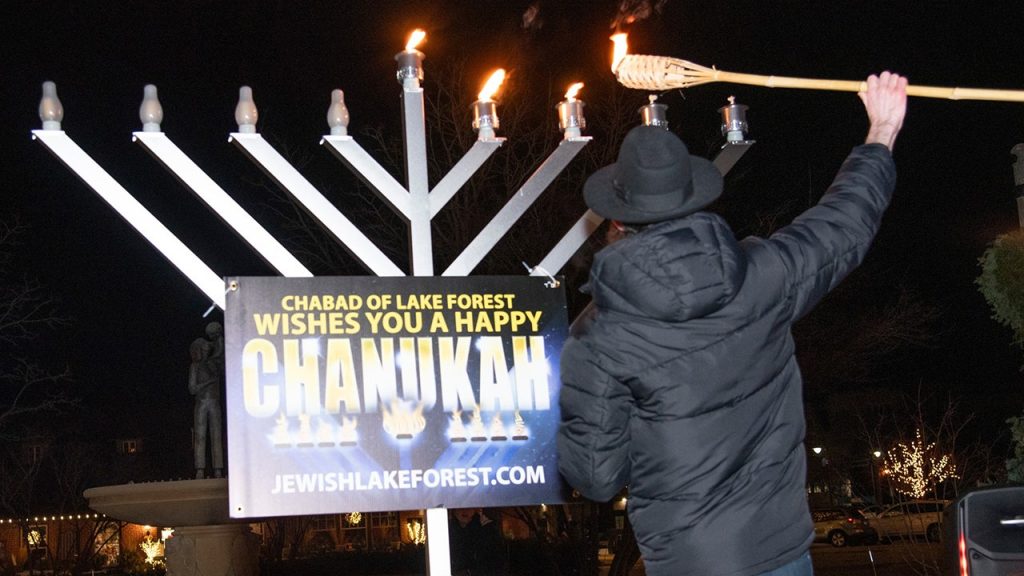The city of Lake Forest, Illinois, has become embroiled in a controversy surrounding the duration of a Hanukkah menorah display in its Market Square shopping center. While the city will permit a menorah lighting ceremony on December 29, 2024, with the mayor and other elected officials participating, it has decided against allowing the menorah to remain on display for the full eight days of Hanukkah, sparking disappointment and a petition drive by community members. This decision marks a departure from the previous year’s practice, when the menorah graced Market Square for the entirety of the holiday, a gesture appreciated by many as a symbol of inclusivity and diversity.
The city’s rationale for limiting the display’s duration rests on legal advice concerning the consistent and equitable use of public spaces. According to the city’s official statement, allowing an extended display for one religious group would necessitate permitting similar requests from all groups, creating logistical challenges for managing public spaces. To avoid such complications and maintain uniformity, the city has opted to restrict displays on public property to time-limited installations associated with organized events. This policy effectively confines the menorah’s presence to the duration of the lighting ceremony itself.
A Change.org petition, initiated by a self-identified local interfaith family, has garnered over 6,500 signatures as of Tuesday, demanding the city reconsider its decision and reinstate the eight-day display. The petition highlights the positive impact of last year’s extended display, describing it as a source of joy for the community and a testament to Lake Forest’s embrace of diverse cultural and religious traditions. The petitioners argue that the city’s current stance undermines this spirit of inclusivity and disregards the sentiments of those who valued the menorah’s presence throughout Hanukkah. They urge the city to restore the previous practice, emphasizing the importance of showcasing the community’s rich tapestry of beliefs and customs.
Rabbi Moshe Spalter of Chabad of Lake Forest, the organization behind the menorah display, confirmed that 2023 marked the first time the menorah had been displayed in Market Square for the full eight days of Hanukkah. He expressed his disappointment with the city’s change of heart this year, acknowledging that while the city initially embraced the idea, they subsequently reevaluated their position. Rabbi Spalter maintains a preference for an extended display and hopes to work with the city well in advance of next year’s Hanukkah to secure permission for a full eight-day display in the future. Despite the current setback, he encourages community members to attend the lighting ceremony, emphasizing its importance as a unifying event in light of the ongoing controversy. He sees the event as an opportunity for the community to come together and celebrate shared values, fostering understanding and mutual respect.
The situation in Lake Forest reflects broader discussions across the country about the display of religious symbols on public property. The Establishment Clause of the First Amendment to the United States Constitution prohibits the government from establishing a religion, raising questions about the permissibility of government-sponsored religious displays. Court precedents have generally allowed for such displays, provided they do not have the primary effect of advancing or inhibiting religion and do not result in excessive government entanglement with religion. This often involves considering factors such as the context of the display, the presence of other secular symbols, and the overall message conveyed.
The controversy in Lake Forest underscores the complexities of navigating these legal and social considerations. Balancing the desire for religious expression with the principle of government neutrality towards religion requires careful consideration and often leads to difficult decisions. While the city has chosen a course of action it believes aligns with legal guidance and promotes equitable use of public spaces, community members who value the extended menorah display view the decision as a step back from inclusivity and a missed opportunity to celebrate the diversity that enriches Lake Forest. The ongoing dialogue surrounding this issue highlights the ongoing tension between religious freedom and the separation of church and state, a debate that is likely to continue playing out in communities across the nation.

